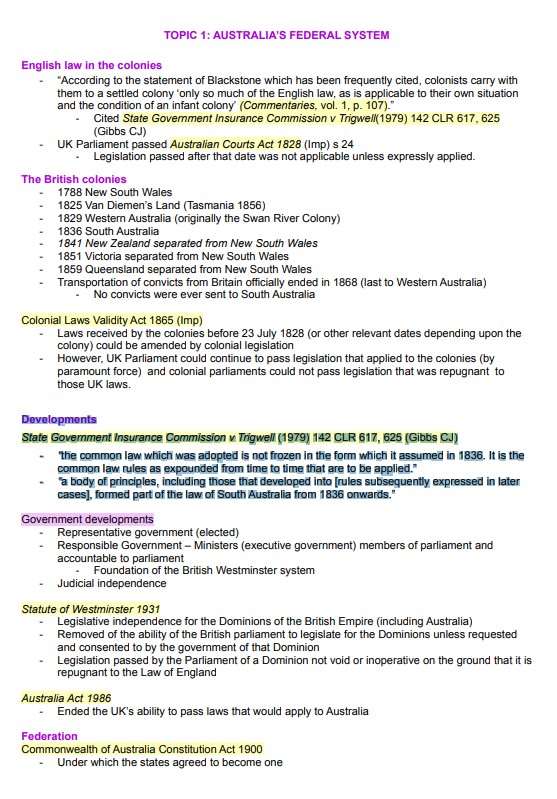Key Legal Concepts and Institutions (Overview of LLAW1311)
Summary:
This Key Legal Concepts and Institutions (Overview of LLAW1311) note explains that in the context of LLAW1311, students explore crucial legal concepts and institutions, such as the legislature, judiciary, and executive branches of government, as well as the separation of powers principle. Additionally, the course covers state constitutional law and the relationship between law and justice. By understanding these key elements, students gain a solid foundation in the structure and function of the legal system, enabling them to navigate complex legal issues and contribute to the development and enforcement of just laws.
Excerpt:
Key Legal Concepts and Institutions (Overview of LLAW1311)
TOPIC 1: AUSTRALIA’S FEDERAL SYSTEM
English law in the colonies
– “According to the statement of Blackstone, which has been frequently cited, colonists carry with them to a settled colony ‘only so much of the English law, as is applicable to their own situation and the condition of an infant colony’ (Commentaries, vol. 1, p. 107).”
– Cited State Government Insurance Commission v Trigwell(1979) 142 CLR 617, 625 (Gibbs CJ)
– UK Parliament passed Australian Courts Act 1828 (Imp) s 24
– Legislation passed after that date was not applicable unless expressly applied.
The British colonies
– 1788 New South Wales
– 1825 Van Diemen’s Land (Tasmania 1856)
– 1829 Western Australia (originally the Swan River Colony)
– 1836 South Australia
– 1841 New Zealand separated from New South Wales
– 1851 Victoria separated from New South Wales
– 1859 Queensland separated from New South Wales
– Transportation of convicts from Britain officially ended in 1868 (last to Western Australia)
– No convicts were ever sent to South Australia
Colonial Laws Validity Act 1865 (Imp)
– Laws received by the colonies before 23 July 1828 (or other relevant dates depending upon the colony) could be amended by colonial legislation
– However, UK Parliament could continue to pass legislation that applied to the colonies (by paramount force), and colonial parliaments could not pass legislation that was repugnant to those UK laws.
Developments
State Government Insurance Commission v Trigwell (1979) 142 CLR 617, 625 (Gibbs CJ)
– “the common law which was adopted is not frozen in the form which it assumed in 1836. It is the
common law rules as expounded from time to time that is to be applied.”
….


Reviews